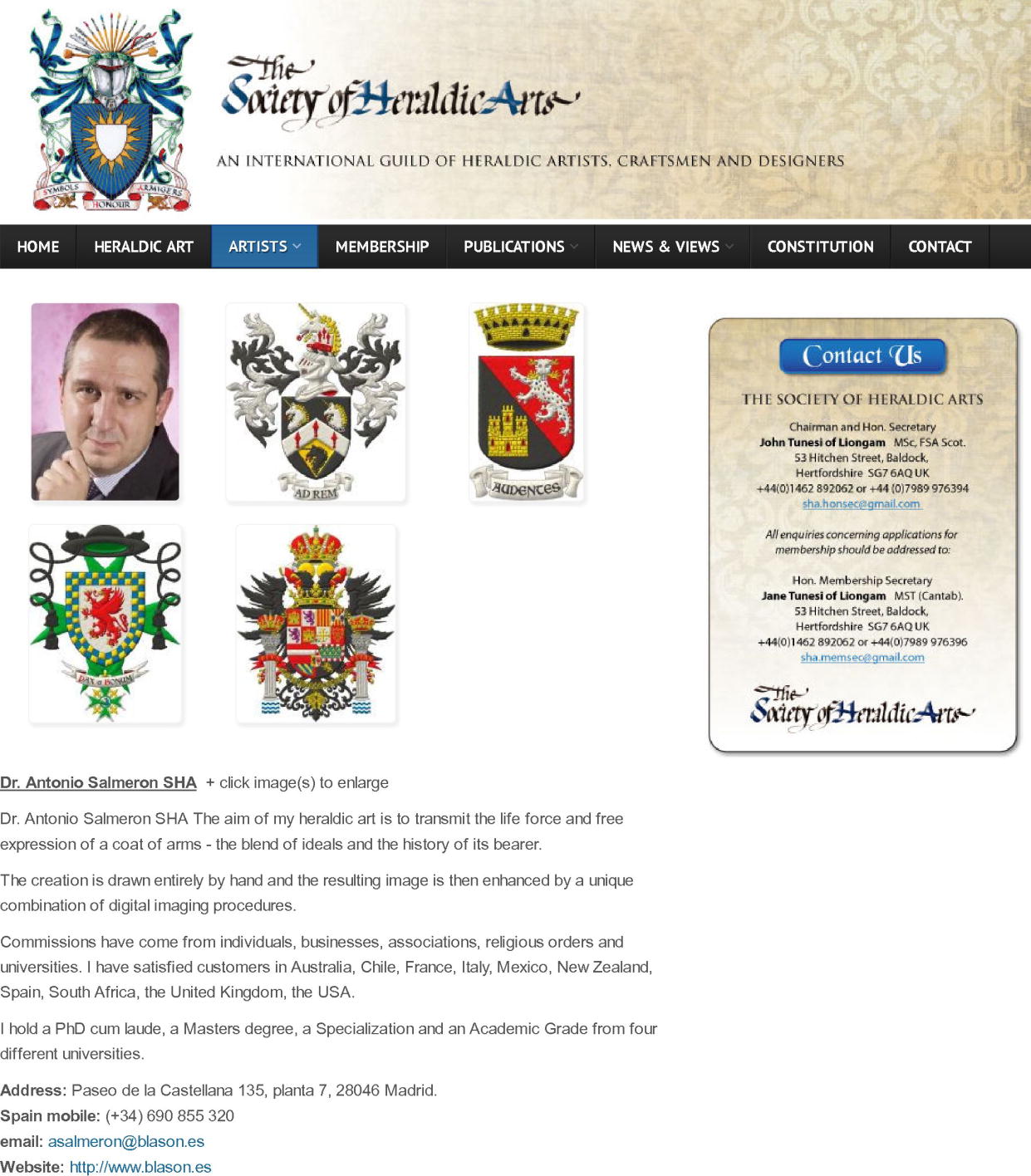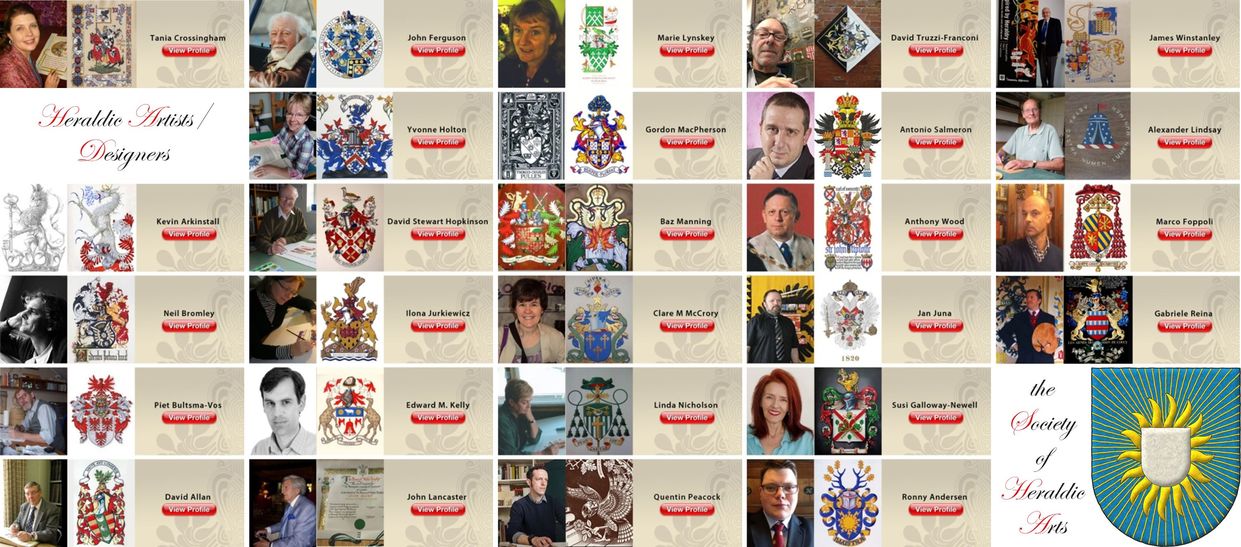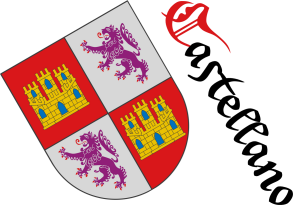
Dr. Antonio Salmeron SHA
I am a member as a heraldic artist of the Society of Heraldic Arts having passed their artistic selection tests.
Probably, I have had the honor of being the first Spanish artist accepted within it and, perhaps, the first of all in the Spanish-speaking world.
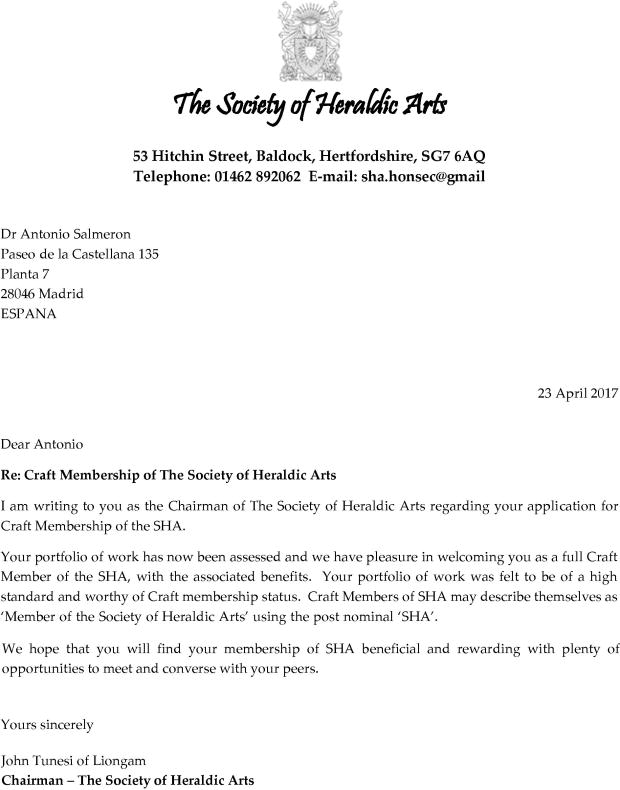
Within the Society of Heraldic Arts, there are two different classes of members:
-
those who are professionals in the various
expressive forms of heraldic art, such as:
- heraldic painting and drawing and, as a heraldic artist, I am a member within this category,
- calligraphy,
- ex libris engraved or delineated,
- illustration and illumination of documents,
- heraldic craftsmen of stone, wood, glass, or plaster.
- heraldic jewelry and seal making, etc.
-
and those who:
- aspire to become professionals in heraldic art, or
- are passionate about heraldry without necessarily practicing heraldic art.


![Ver [Martinena Ruiz, J. J.; 1982] en referencias bibliográficas. Libro abierto, hojas de plata, filo de oro, guardas de gules, tapas de sable.](../css/Libro.Bibliografia.png)
Martinena Ruiz, J. J.; 1982
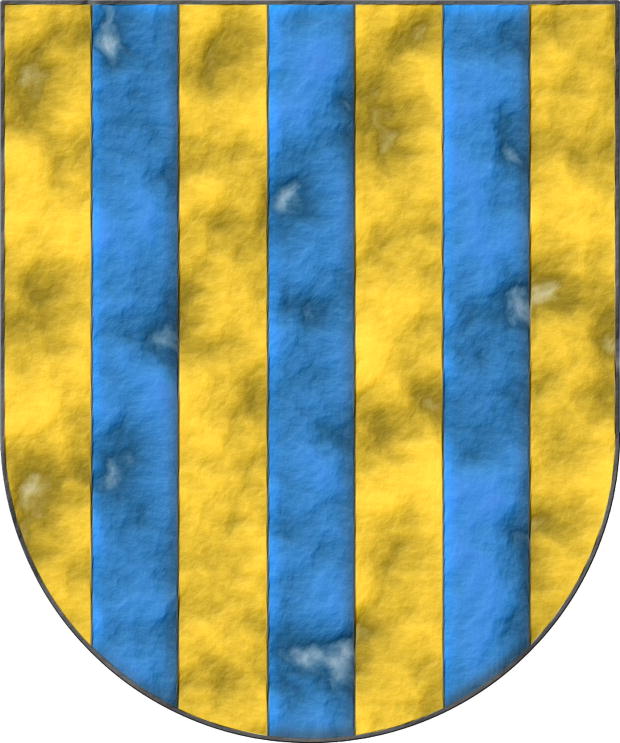
Juan José Martinena Ruiz, «Book of Armory of the Kingdom of Navarra: Introduction, Study, and Notes», published by the Institución Príncipe de Viana, 350 pages, ISBN 84-235-0557-X, Pamplona, 1982.
Introduction, study, and notes on the armorial [Bosque, J. del; 1540]. On pages 122 and 123, the coats of arms of the «ricoshombres» of Navarra, or «twelve barons of the major houses» as they are also called, surrounding the king's coat of arms in this armorial are compiled and transcribed.
The coat of arms accompanying this bibliographic reference is that of Almorrabides de Navarra following Juan del Bosque.
Bibliographical reference of century XX.
Author: Martinena Ruiz, Juan José.
The following articles cite this bibliographic reference:
- Almorrabides of Navarre
- Aybar of Navarre
- Baztanes of Navarre
- Bosque, J. del; 1540
- Guebara of Navarre
- Lete of Navarre
- Martinena Ruiz, J. J.; Menéndez Pidal de Navascués, F.; 2001
- Mauleón of Navarre
- Monteagudo of Navarra
- Navarra, closed carbuncle
- Noblemen of Navarre
- Qasqante of Navarre
- Rada of Navarre
- Subiça of Navarre
- Urroz of Navarre
- Vidaurre of Navarre
External resources:


![Ver [Martínez de Aguirre, J.; 2007] en referencias bibliográficas. Libro abierto, hojas de plata, filo de oro, guardas de gules, tapas de sable.](../css/Libro.Bibliografia.png)
Martínez de Aguirre, J.; 2007
Javier Martínez de Aguirre Aldaz, «Faustino Menéndez Pidal de Navascués: Researcher of Navarrese Heraldry», Revista Príncipe de Viana, ISSN 0032-8472, year number 68, issue number 241, dedicated to the tribute to Faustino Menéndez Pidal de Navascués, pages 343-358, Government of Navarra, Institución Príncipe de Viana, Pamplona, 2007.
This article highlights the analysis of the importance of the publication of [Menéndez Pidal de Navascués, F.; 1963] to understand what is possibly the true origin of the shield of Navarra, surpassing the legends about the chains (the most widespread being the Battle of Las Navas de Tolosa and the less widespread of Archangel Michael and the devil turned dragon), and basing its origin on the evolution of the shield's block to the radiated block, as elements of defensive reinforcement, giving rise to the carbuncle as a heraldic element.
It also describes well how, over time, this theory of the radiated block and the carbuncle, permeated Navarrese society, in parallel with political changes, and the historical and heraldic academic opinion.
Javier Martínez de Aguirre Aldaz had already published together with Faustino Menéndez Pidal de Navascués, 7 years earlier about the shield of Navarra, [Menéndez Pidal de Navascués, F.; Martínez de Aguirre, J.; 2000].
Bibliographical reference of century XXI.
Author: Martínez de Aguirre Aldaz, Javier.
Here are the articles quoting this reference:
- Menéndez Pidal de Navascués, F.; 1963
- Menéndez Pidal de Navascués, F.; 1974
- Menéndez Pidal de Navascués, F.; Martínez de Aguirre, J.; 2000
- Navarra, closed carbuncle
External resource:
Internal resources: MartínezAguirreJ2007.MenendezPidalNavarra.pdf.


![Ver [Menéndez Pidal de Navascués, F.; 1963] en referencias bibliográficas. Libro abierto, hojas de plata, filo de oro, guardas de gules, tapas de sable.](../css/Libro.Bibliografia.png)
Menéndez Pidal de Navascués, F.; 1963
Faustino Menéndez Pidal de Navascués, «A Leónese Heraldic Embroidery: the Carbuncle in Medieval Coats of Arms», published in the journal Armas e Troféus, 2nd series, Volume IV, pages 5-19, Braga, 1963.
Article reissued and included, 36 years later, in his book [Menéndez Pidal de Navascués, F.; 1999; pages 47-66].
Also published later in the Revista Príncipe de Viana, ISSN 0032-8472, year number 68, issue number 241, dedicated to the tribute to Faustino Menéndez Pidal de Navascués, pages 403-412, Government of Navarra, Institución Príncipe de Viana, Pamplona, 2007.
[Martínez de Aguirre, J.; 2007; page 344 and following] provides a good analysis of the importance of this work both for Navarrese heraldry and specifically for its coat of arms, as well as for heraldry in general.
Bibliographical reference of century XX.
Author: Menéndez Pidal de Navascués, Faustino.
Here are the articles quoting this reference:
- Martínez de Aguirre, J.; 2007
- Menéndez Pidal de Navascués, F.; 1999
- Navarra, closed carbuncle
- Navarre
- University of Navarra
External link:
Internal resources: MenendezPidalDeNavascuesF1963.BordadoHeraldicoLeonesCarbuncloEscudosMedievales.pdf.


![Ver [Menéndez Pidal de Navascués, F.; 1974] en referencias bibliográficas. Libro abierto, hojas de plata, filo de oro, guardas de gules, tapas de sable.](../css/Libro.Bibliografia.png)
Menéndez Pidal de Navascués, F.; 1974
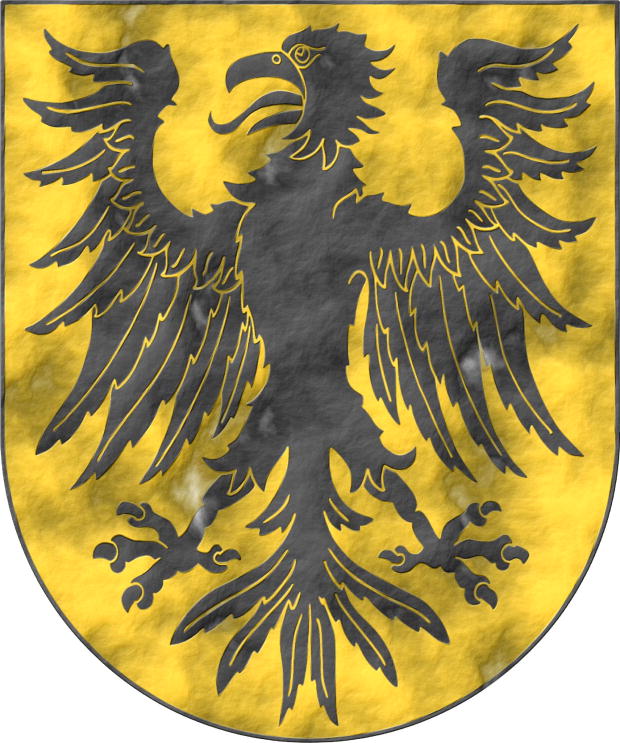
Faustino Menéndez Pidal de Navascués, «Book of Armory of the Kingdom of Navarra: Transcription and Study», published by La Gran Enciclopedia Vasca, 160 pages, ISBN 84-248-0119-9, Bilbao, 1974.
Transcription and study of the Navarrese manuscript armorial [Bosque, J. del; 1540], preserved in the General Archive of Navarra.
This book contains an introduction, the transcription of the armorial texts, its photographic reproduction, which also includes the Navarrese coats of arms of the Reyneck armorial and the coat of arms of the refectory of the Cathedral of Santa María la Real de Pamplona, an index of names, a heraldic table, and a set of appendices [Martínez de Aguirre, J.; 2007; page 351].
The coat of arms accompanying this bibliographic reference is that of Qasqante de Navarra following, precisely, the armorial of Juan del Bosque.
Bibliographical reference of century XX.
The author is Menéndez Pidal de Navascués, Faustino.
Bibliographic reference mentioned in the following articles:
- Bosque, J. del; 1540
- Martinena Ruiz, J. J.; Menéndez Pidal de Navascués, F.; 2001
- Navarra, closed carbuncle
External resources:


![Ver [Menéndez Pidal de Navascués, F.; 1985] en referencias bibliográficas. Libro abierto, hojas de plata, filo de oro, guardas de gules, tapas de sable.](../css/Libro.Bibliografia.png)
Menéndez Pidal de Navascués, F.; 1985
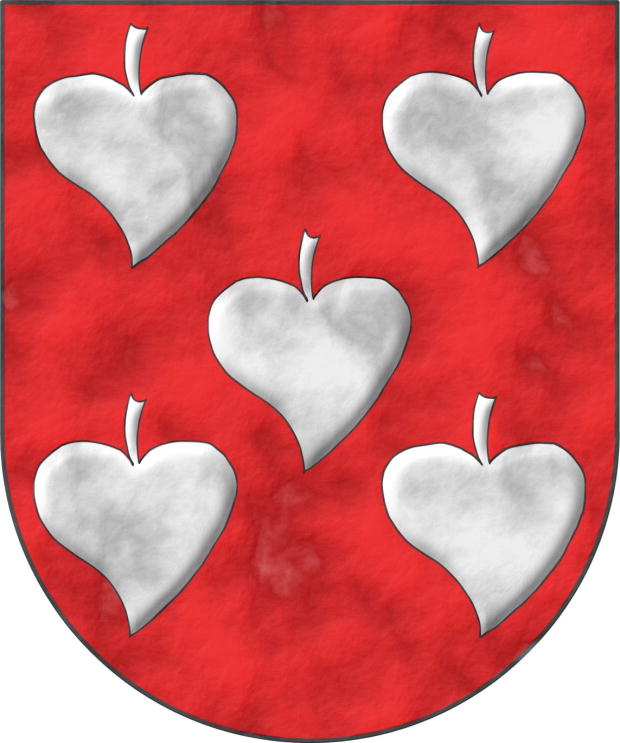
Faustino Menéndez Pidal de Navascués, «Rare and Ambiguous Charges of Spanish Heraldry», Revista Hidalguía, issue 190 and 191, Ediciones Hidalguía, Madrid, 1985.
The coat of arms with squares accompanying this bibliographic reference is that of Guebara de Navarra, an interpretation based on that by [Bosque, J. del; 1540]. I chose this coat of arms because Faustino Menéndez Pidal writes precisely about it and about the squares as a figure typical of Spanish heraldry, for example, he does so on pages 474 and 475 of this article.
Bibliographical reference of century XX.
Author: Menéndez Pidal de Navascués, Faustino.
Bibliographical reference mentioned in the following article:
External resource:
Internal resources: MenendezPidalDeNavascuesF1985.MueblesRarosHeraldicaEspañola.pdf.


![Ver [Menéndez Pidal de Navascués, F.; 1999] en referencias bibliográficas. Libro abierto, hojas de plata, filo de oro, guardas de gules, tapas de sable.](../css/Libro.Bibliografia.png)
Menéndez Pidal de Navascués, F.; 1999
Faustino Menéndez Pidal de Navascués, «Lions and Castles: Heraldic Emblems in Spain», published by the Real Academia de la Historia, ISBN 9788489512399, 306 pages, Madrid, 1999.
This book also includes his article [Menéndez Pidal de Navascués, F.; 1963] which, based on the observation of a «Leonese embroidery» concludes about the carbuncle and the coat of arms of Navarra.
Bibliographical reference of century XX.
The author is Menéndez Pidal de Navascués, Faustino.
The following articles cite this bibliographic reference:


![Ver [Menéndez Pidal de Navascués, F.; Martínez de Aguirre, J.; 2000] en referencias bibliográficas. Libro abierto, hojas de plata, filo de oro, guardas de gules, tapas de sable.](../css/Libro.Bibliografia.png)
Menéndez Pidal de Navascués, F.; Martínez de Aguirre, J.; 2000
Faustino Menéndez Pidal de Navascués and Javier Martínez de Aguirre Aldaz, «The Coat of Arms of Navarra», published by the Government of Navarra, Department of Presidency, Justice, and Interior, ISBN 84-235-2016-1, 115 pages, Pamplona, 2000.
This is one of the many publications by Faustino Menéndez Pidal de Navascués on the Navarrese armorial [Bosque, J. del; 1540]. Later, 7 years after, Javier Martínez de Aguirre Aldaz, co-author of this book, would publish an interesting article, [Martínez de Aguirre, J.; 2007], about Faustino Menéndez Pidal de Navascués as a researcher of Navarrese heraldry.
Bibliographical reference of century XX.
Authors: Menéndez Pidal de Navascués, Faustino and Martínez de Aguirre Aldaz, Javier.
Bibliographic reference mentioned in the following articles:
External resource:

Continue with: Urfe; Century XV.
-
Language
-
Categories of heraldry
-
Divisions of the field
- Without divisions
- Party per pale
- Party per fess
- Party per bend
- Party per bend sinister
- Tierce
- Tierce sinister
- Tierced per pale
- Tierced per fess
- Tierced per bend
- Tierced pallwise inverted
- Quarterly
- Quarterly per saltire
- Gyronny
- Party per fess, the chief per pale
- Party per pale, the sinister per fess
- Party per fess, the base per pale
- Party per pale, the dexter per fess
- Chapé
- Chaussé
- Embrassé
- Contre-embrassé
- Party per chevron
- Enté
- Enté en point
- Flanched
-
Metals
-
Colours
-
Furs
-
Other tinctures
-
Ordinaries and sub-ordinaries
-
Diminutives of the ordinaries
-
Geometric charges
-
Composite ordinaries
-
Inanimate charges from Nature
Atom, Crescent, Diamond, Emerald, Estoile, Increscent, Lightning flash, Moon, Mount, Mullet, Mullet of four points, Orbital, Plough of Ursa Major, Rainbow, Ray of the sun, River, Sea, Snowflake, Sun, Sun in splendour, Sun of May, Terrestrial globe, Trimount, Water and Wave.
-
Vegetal charges from Nature
Acorn, Apple, Apple tree, Ash, Bluebonnet, Camellia, Chrysanthemum, Cinquefoil, Cornflower, Dogwood flower, Double rose, Eguzki-lore, Elm, Fleur de lis, Flower, Gourd, Holm oak, Hop cone, Indian paintbrush, Kapok tree, Laurel, Lily, Linden, Lotus flower, Madonna lily, Mexican cedar tree, Oak, Olive tree, Palm tree, Plantain plant, Pomegranate, Poplar leaf, Rose, Shamrock, Sunflower, Thistle, Tree, Tulip, Vine and Wheat.
-
Animal charges from Nature
Badger, Bald eagle, Barbel, Barn owl, Bear, Beaver, Bee, Beetle, Bighorn sheep, Binson, Blackbird, Boar, Brach hound, Bull, Cow, Doe, Dog, Dolphin, Dove, Eagle, Elephant, Falcon, Female figure, Fish, Flame, Fly, Fox, Frog, Goat, Goldfinch, Goose, Heron, Horse, Hummingbird, Jaguar, Lark, Leopard, Lion, Lion passant, Lion rampant guardant, Lioness, Lynx, Male figure, Martlet, Merino ram, Owl, Panther, Parrot, Peacock, Pelican, Pelican in her piety, Pronghorn, Puffin, Quetzal, Raven, Roe deer, Rooster, Savage, Seagull, Serpent, She-wolf, Stag, Starling, Talbot, Turtle, Tyger, Vulture, Warren hound and Wolf.
-
Parts of natural charges
Arm, Beak, Branch, Caboshed, Chest, Claw, Covert, Dorsal fin, Eagle claw, Ear of wheat, Ermine spot, Escallop, Feather, Foot (palmiped), Foreleg, Forepaw, Hand, Head, Heart, Hoof, Leaf, Neck, Ostrich feather, Palm frond, Paw, Roe deers' attires, Shoulder, Sprig, Stags' attires, Stem, Swallow-tail, Tail, Tail addorsed, Tail fin, Talon, Tibia, Tooth, Trunk, Trunk (elephant), Two hands clasped, Two wings in vol, Udder, Wing and Wrist.
-
Artificial charges
Ace of spades, Anchor, Anvil, Arch, Arm vambraced, Armillary sphere, Arrow, Axe, Bell, Bell tower, Beret, Bonfire, Book, Bookmark, Bow, Branding iron, Bridge, Broken, Buckle, Cannon, Cannon dismounted, Cannon port, Canopy roof, Carbuncle, Castle, Celtic Trinity knot, Chain, Chess rooks, Church, Clarion, Clay pot, Closed book, Club, Column, Comb, Compass rose, Conductor's baton, Cord, Covered cup, Crozier, Crucible, Cuffed, Cup, Cyclamor, Dagger, Displayed scroll, Double vajra, Drum, Ecclesiastical cap, Fanon, Federschwert, Fleam, Four crescents joined millsailwise, Galician granary, Garb, Gauntlet, Geometric solid, Grenade, Halberd, Hammer, Harp, Host, Hourglass, Key, Key ward, Knight, Knot, Lantern, Letter, Line, Loincloth, Maunch, Menorah, Millrind, Millstone, Millwheel, Monstrance, Mortar, Mullet of six points pierced, Nail, Non-classic artifact, Norman ship, Number, Oar, Oil lamp, Open book, Page, Pair of pliers, Pair of scales, Parchment, Pestle, Piano, Pilgrim's staff, Plough share, Polish winged hussar, Port, Portcullis, Potent, Quill, Ribbon, Rosette of acanthus leaves, Sabre, Sackbut, Sail, Scroll, Scythe, Sheaf of tobacco, Ship, Skirt, Spear, Spear's head, Stairway, Star of David, Step, Sword, Symbol, Tetrahedron, Torch, Tower, Trident, Trumpet, Turret, Two-handed sword, Wagon-wheel, Water-bouget, Wheel, Winnowing fan and With a turret.
-
Immaterial charges
Angel, Archangel, Basilisk, Dragon, Dragon's head, Garuda, Golden fleece, Griffin, Heart enflamed, Justice, Mermaid, Our Lady of Mercy, Ouroboros, Paschal lamb, Pegasus, Phoenix, Sacred Heart of Jesus, Saint George, Sea-griffin, Sea-lion, Trinity, Triton, Unicorn, Winged hand and Wyvern.
-
External elements
-
Heraldic creations
-
References
-
Formats
-
Keywords on this page
Armorial roll, Azure, Bibliography, Doctor, In black and white, Gules, French language, Manuscript, Or, Pale, Poplar leaf, Argent, Without divisions, Kingdom of Navarre, Sable, Century XV, Century XX, Century XXI, Society of Heraldic Arts and Eagle.

